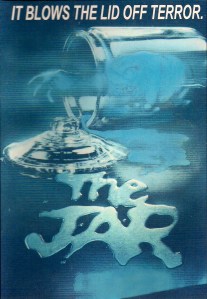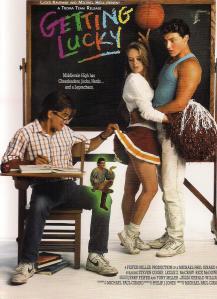The Jar (1984) ***
Paul (Gary Wallace) is a dull, bearded man who will spend most of The Jar wandering through nightmares and staring at his surroundings with irritable angst after experiencing a fateful auto accident. The other driver, a strange old man (Les Miller), is shaken and uncommunicative, so Paul takes him home with him to his apartment. The elderly gentleman soon disappears, but leaves behind him a jar wrapped in a paper sack. Inside the jar is a little blue demon, and before very long Paul is suffering visions of his bathtub filling with blood and his shower head emitting rays of otherworldly light that transport him into a dark, rocky pit. Crystal (Karin Sjoberg), a beautiful, bright-eyed brunette with a dimpled chin, for some reason takes an interest in Paul, wants to date him, and attempts to drag this drab, unfriendly nutcase out of his madness and increasing isolation.
An offbeat, minimalist horror obscurity that will try and annoy all but the most open-minded seekers after the arcane, The Jar is a film that flouts conventions, refusing to conform to the expectations of genre buffs. People who rented the video based on the cover image of what the box describes as “a repulsive, embryonic creature” and hoped for another Gremlins (1984) or Ghoulies (1985) must have been sorely disappointed, as the thing only appears onscreen for a second or two at a time and is almost totally inanimate, to boot. Unremittingly weird and yet frequently boring, The Jar‘s most unforgivable fault is that next to nothing happens for the duration of its draggy 85 minutes.
On the plus side, The Jar has quite a few eerie moments and shows how scuzzy production values and a cast of non-professional actors can sometimes evoke more menace and atmosphere than high-dollar horror. The Jar, in a Vietnam flashback scene, also contains the most maddening helicopter noise ever heard in a film, the electronic sound design doing much to sustain viewer interest for much of this rather frustrating movie. Unsurprisingly, this was writer George Bradley’s and director Bruce Toscano’s only film.
3 out of 5 stars.
Getting Lucky (1990) ****
Bill (Steven Cooke) is a nerdy, liberal weenie and recycling enthusiast being bullied by the jocks at school when he fortuitously finds a recovering alcoholic leprechaun (Garry Kluger) in a beer bottle. Granted three wishes, Bill naturally wants a shot at hot cheerleader Krissi (Lezlie Z. McCraw), which brings him into intensified conflict with sadistic stud Tony (Rick McDowell), who also wants to get his paws on her. The hit-and-miss Irish magic results in such memorable moments as Bill being turned into a cat, Tony’s tennis racket coming to life and giving him a whacking, and Bill shrinking to mite size, riding a naked vixen’s bar of soap as she lathers herself, and bouncing around in Krissi’s panties and holding on for dear life in the perilous jungle of her pubes. Throw in a few quaint soft rock songs, and Getting Lucky has the makings of an 80s classic.
Admittedly, Getting Lucky, sporting its 1990 copyright, is not technically an 80s movie, but it does demonstrate nicely how the early 90s were in many instances a holdover, a culmination, or a last gasp of the 80s – and so it narrowly squeezes in as an 80s Oddities Month pick. Something of a straggler within its genre, Getting Lucky is essentially a throwback to the early-to-mid-80s variety of teen raunch comedy, a genre which had lost steam over the course of the decade, with the charming likes of Screwballs (1983) and Hot Moves (1984) having given way to lamely tame youth fare like The Allnighter (1987) and How I Got into College (1989). At the same time, Getting Lucky‘s imaginative nastiness is tempered by a sweetness and innocence that at times recalls The Virgin Queen of St. Francis High (1987).
4 out of 5 stars. Recommended to fans of films of this type.


